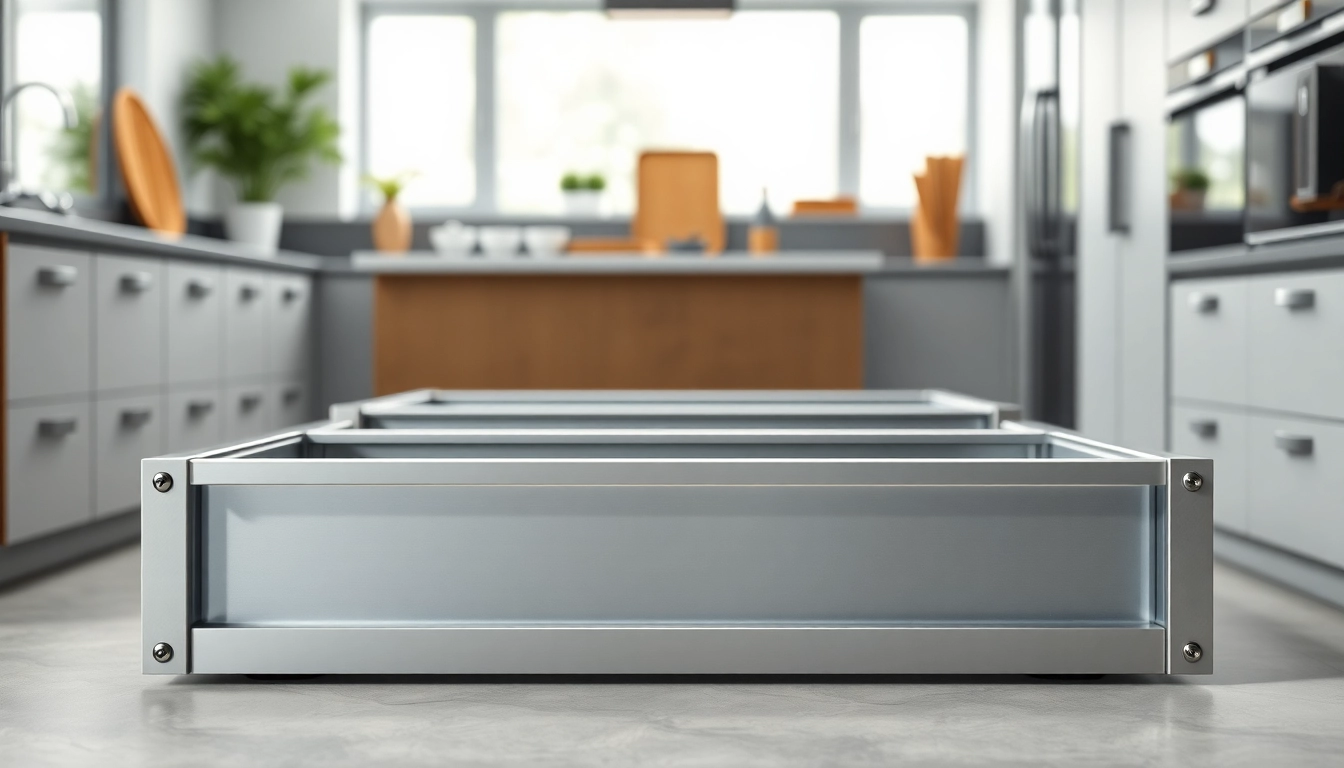
Understanding Metal Drawer Systems
A Metal Drawer System is an essential component in modern cabinetry, making it a popular choice among homeowners and professionals alike. These systems provide functionality and aesthetics, enhancing the usability and appearance of furniture in kitchens, offices, and industrial settings. In this article, we will delve into the various aspects of metal drawer systems, exploring their features, benefits, common applications, and installation methods.
What is a Metal Drawer System?
The term “metal drawer system” refers to a collection of components specifically designed to create drawers that are made predominantly from metal materials. These systems typically include features such as drawer slides, boxes, and supports that utilize robust metal construction to provide durability and strength. Unlike traditional wooden drawers, metal drawer systems can withstand greater weight and stress levels, making them ideal for various storage needs.
Key Features of Metal Drawer Systems
- Durability: Metal drawers are less susceptible to warping, swelling, or damage from moisture compared to their wooden counterparts.
- Load Capacity: Most metal drawer systems can support significantly heavier loads, ideal for heavy-duty storage requirements.
- Design Versatility: Metal drawers can be finished in various colors and styles, suitable for a wide range of interior designs.
- Smooth Operation: Many metal drawer systems come with ball-bearing slides, allowing for effortless opening and closing.
- Low Maintenance: Metal surfaces can be easily cleaned, and finishes are often resistant to stains and scratches.
Types of Metal Drawer Systems Available
Metal drawer systems can be categorized based on aspects such as design, functionality, and application:
- Undermount Drawer Slides: These are concealed slides installed beneath the drawer, offering a clean look and smooth operation.
- Side Mount Drawer Slides: Mounted on the sides of the drawers, these slides are easily visible, making assembly straightforward.
- Heavy-Duty Drawer Slides: Designed for heavier applications, these slides can carry substantial loads, making them perfect for industrial settings.
- Full Extension Slides: Allow the entire drawer to be pulled out, providing easy access to contents at the back.
- Soft Close and Self-Close Slides: These features prevent slamming and ensure the drawer closes securely and quietly.
Benefits of Metal Drawer Systems
Choosing a metal drawer system provides numerous advantages that can significantly enhance your storage solutions.
Durability and Longevity
Metal drawer systems are built to last, often outliving wooden drawers by many years. The structural integrity of materials like steel or aluminum resists everyday wear and tear, making them a smart investment for commercial and home use.
Design Flexibility and Aesthetic Appeal
These systems are available in a variety of finishes and styles, allowing them to blend seamlessly into different environments. Whether in a modern kitchen, a sophisticated office, or an industrial workspace, metal drawers can enhance the overall design.
Ease of Installation and Maintenance
With comprehensive instruction guides available, installing metal drawer systems can be a straightforward process, even for DIY enthusiasts. Additionally, metal drawers require minimal maintenance; a simple wipe-down is usually all that is needed to keep them looking new.
Common Applications for Metal Drawer Systems
Metal drawer systems are exceptionally versatile and can be utilized across various settings:
Residential Uses in Kitchens and Living Spaces
In residential applications, metal drawer systems are popular in kitchens, bathrooms, and closet spaces. They efficiently hold utensils, pots, and personal items while providing easy access. Their robust nature makes them ideal for frequently used areas where durability is paramount.
Commercial Applications in Offices and Retail
In commercial spaces, metal drawers are commonly found in offices, retail displays, and logistics centers. Their ability to handle substantial weight ensures they can accommodate files, tools, merchandise, and other essential items while maintaining organization.
Industrial Uses in Workshops and Warehouses
In industrial environments, metal drawer systems are invaluable for storing tools, equipment, and materials. Their capacity for heavy loads and durability in tough conditions makes them the go-to solution for workshops and warehousing operations.
Choosing the Right Metal Drawer System
Given the variety of metal drawer systems on the market, choosing the right one requires careful consideration of several factors.
Factors to Consider When Selecting
- Purpose: Determine what you will be storing in the drawers and select a system that can accommodate the weight and type of items.
- Material: Different metals offer varying degrees of durability and aesthetics. Steel is robust, while aluminum might be lighter and more rust-resistant.
- Size and Configuration: Ensure the drawer system fits your space effectively and allows for optimal usage.
- Compatibility: Consider how the drawer system will integrate with existing furniture or cabinetry.
Comparing Different Brands and Models
Research different manufacturers to understand the specifications of various drawer systems. Brands like Häfele, Blum, and Richelieu offer unique features and system variants. Comparison charts can help evaluate options based on factors like price, features, warranties, and customer reviews.
Cost versus Performance Evaluation
While cost is undeniably an essential consideration, it’s crucial to balance it against the performance and longevity of the metal drawer system. Investing more upfront in a higher-quality system can lead to savings in the long run due to reduced replacement and maintenance needs.
Installing Metal Drawer Systems Effectively
Proper installation is vital for ensuring reliable performance from metal drawer systems. Follow these guidelines for effective installation.
Step-by-Step Installation Process
- Preparation: Assemble all necessary tools, including screws, a drill, a level, and a measuring tape.
- Measure Twice: Ensure exact measurements of the cabinet or space where the drawer system will be installed.
- Install Drawer Slides: Fix the slides to the proper points on the cabinet and the drawer boxes, ensuring they are level and straight.
- Attach the Drawer Box: Insert the drawer box into the installed slides, checking for smooth operation.
- Final Adjustments: Make any necessary adjustments to align the drawers correctly and ensure they close smoothly.
Common Mistakes to Avoid
- Ignoring Load Specifications: Always adhere to the manufacturer’s guidelines for weight limits to avoid damaging the system.
- Inaccurate Measurements: Double-check all measurements before cutting or installing to prevent costly mistakes.
- Neglecting Maintenance: Regularly check for wear and tear and address any issues immediately to extend the life of the drawer system.
Maintaining Your Metal Drawer System for Optimal Performance
To keep your metal drawer systems performing at their best, perform regular checks for loose screws and signs of wear. Cleaning the metal with suitable products will remove grime and prevent rust. Regular maintenance extends the lifespan of the drawers and ensures they continue to operate smoothly.







